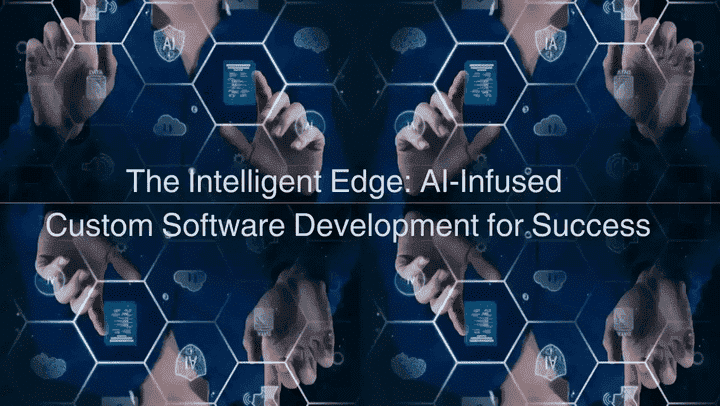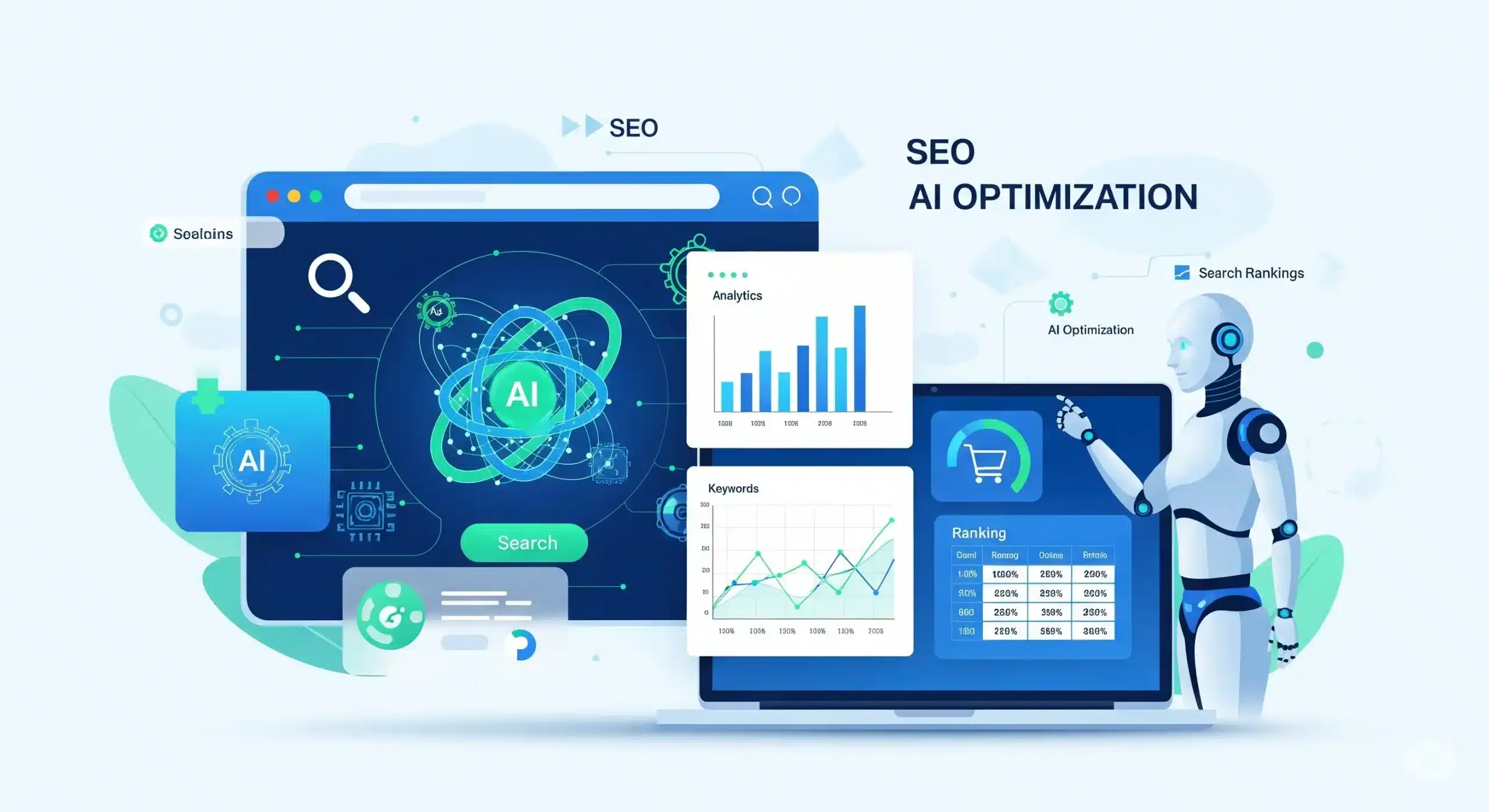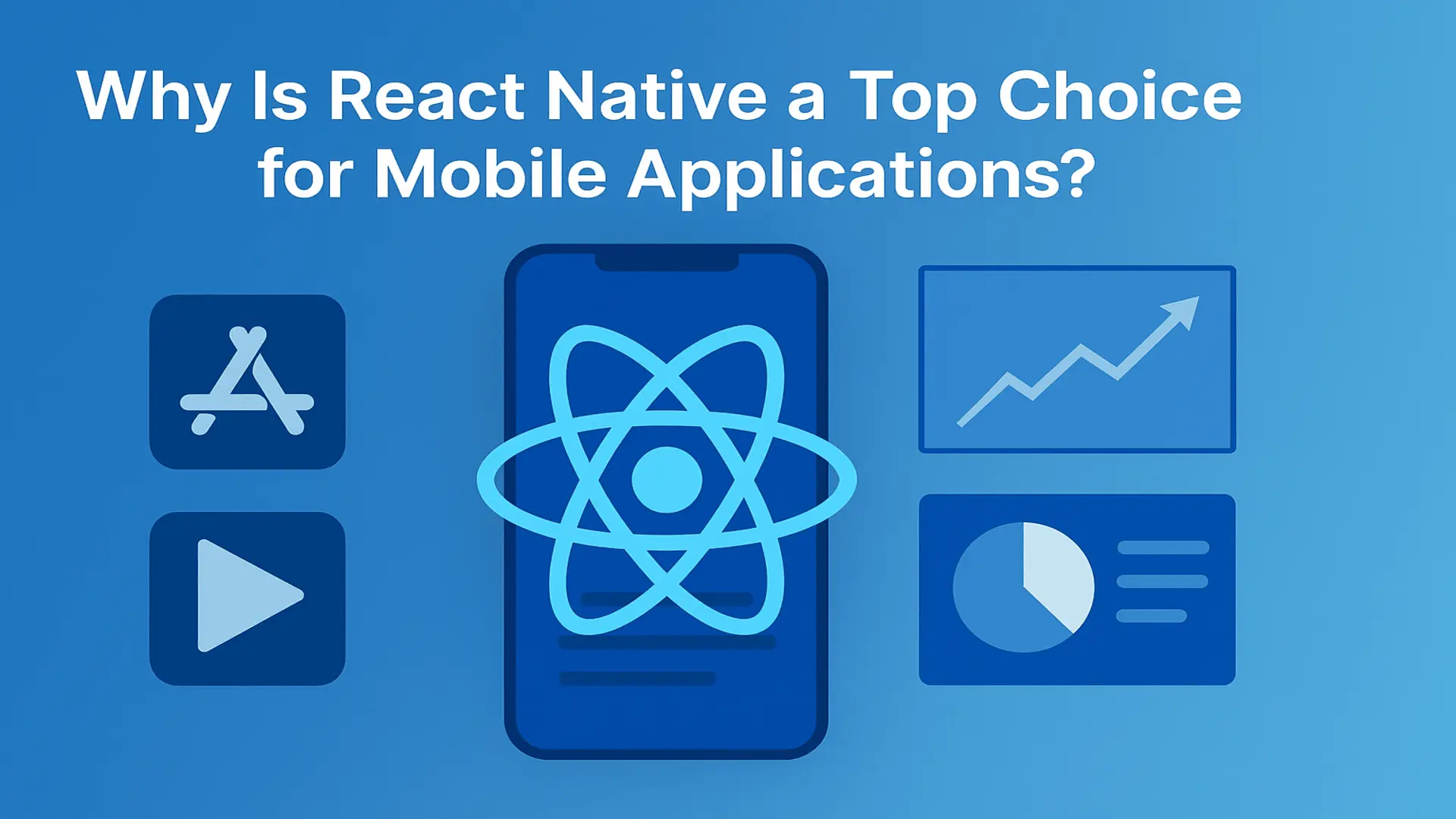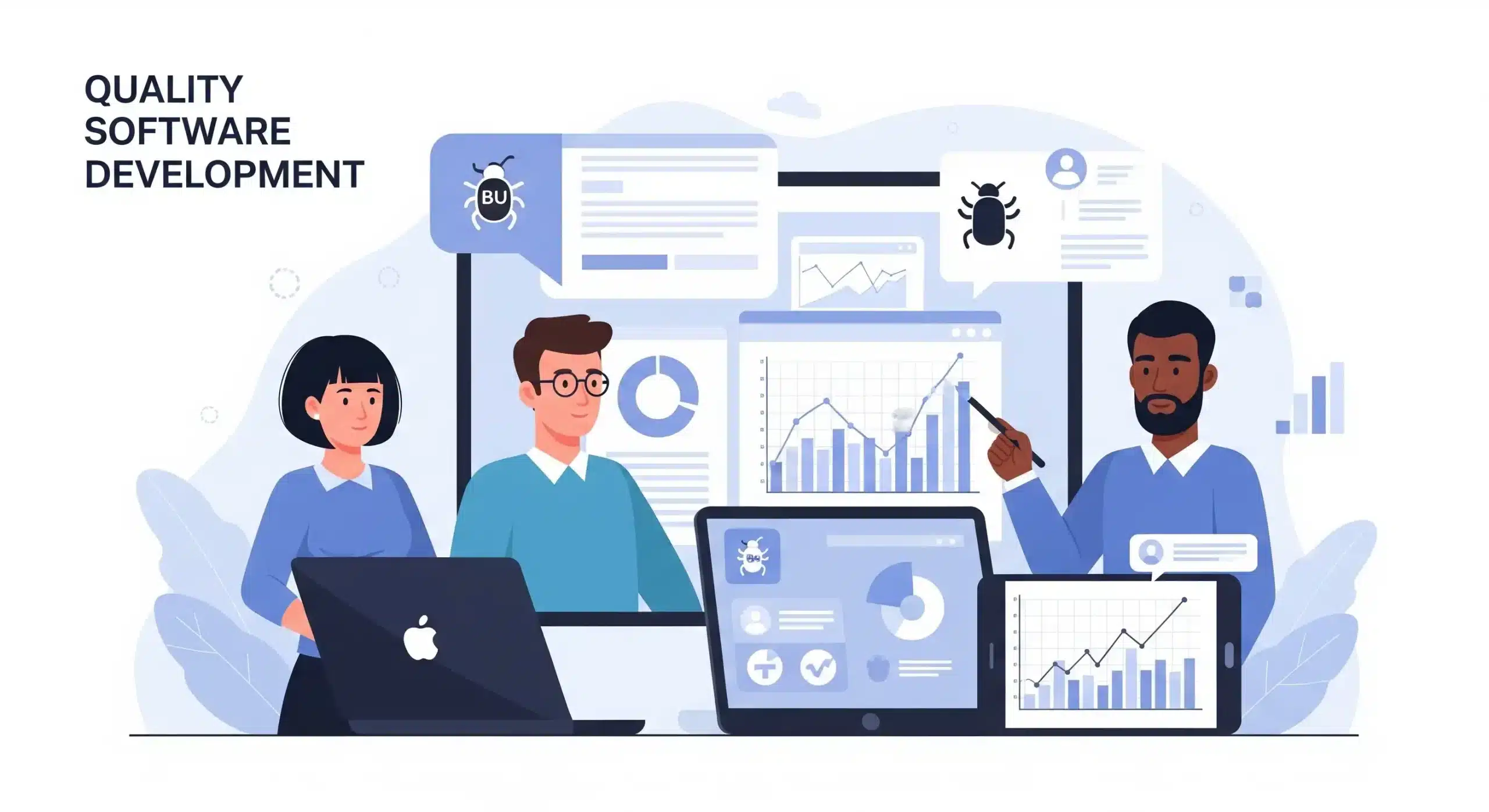The Intelligent Edge: AI-Infused Custom Software Development for Success

The future of software development lies at the intersection of artificial intelligence and customization. With the rise of the intelligent edge, businesses have an opportunity to leverage AI to transform their custom software development process and drive success. In this article, we explore how AI-infused custom software development can unlock new possibilities and help businesses stay ahead in a rapidly evolving digital landscape.
By infusing AI into the development process, organizations can create intelligent software solutions that are capable of learning, adapting, and improving over time. This level of intelligence allows businesses to deliver personalized experiences to their users, enhance productivity, and make data-driven decisions with greater accuracy.
With the right AI-infused custom software, companies can automate repetitive tasks, optimize workflows, and gain valuable insights from vast amounts of data. This not only saves time and resources but also empowers businesses to make smarter and more informed decisions.
Join us as we dive into the world of the intelligent edge and discover how AI-infused custom software development can pave the way for success in the digital age.
Understanding the Intelligent Edge
The intelligent edge refers to the ability of devices and systems to perform data processing and analysis at or near the source of data generation. This decentralized approach brings AI capabilities closer to the devices and users, enabling real-time decision-making without relying on a centralized cloud infrastructure.
By leveraging the intelligent edge, businesses can reduce latency, enhance security, and improve overall system performance. AI-infused custom software development plays a crucial role in enabling the intelligent edge by providing the necessary tools and technologies to build intelligent applications that can operate at the edge.
The Impact of AI on Custom Software Development
AI has revolutionized the field of custom software development by enabling developers to create intelligent applications that can understand, learn, and make predictions based on data. Traditional software development focused on predefined rules and logic, while AI-infused custom software development introduces the ability to learn from data and adapt to changing circumstances.
Moreover, AI algorithms can analyze large datasets, identify patterns, and make predictions, enabling businesses to gain valuable insights and make data-driven decisions. This level of intelligence allows custom software solutions to deliver personalized experiences, automate complex tasks, and improve overall efficiency.
Benefits of AI-Infused Custom Software Development
The benefits of AI-infused custom software development are vast and can have a significant impact on business success. Here are some key advantages:
Personalized Experiences: By leveraging AI, custom software solutions can analyze user behavior, preferences, and context to deliver personalized experiences. This not only enhances user satisfaction but also improves customer loyalty and engagement.
Automation and Optimization: AI-infused custom software can automate repetitive tasks, optimize workflows, and reduce human error. This leads to increased productivity, cost savings, and improved operational efficiency.
Data-driven Decision Making: AI algorithms can process and analyze vast amounts of data to provide valuable insights and predictions. This empowers businesses to make informed decisions, identify trends, and seize opportunities in real-time.
Enhanced Security: AI can be used to detect and prevent security threats by analyzing patterns and anomalies in real-time. This level of intelligence strengthens the security of custom software solutions and protects sensitive data.
Custom AI Software Development Solution For Enterprises
Key Technologies Driving the Intelligent Edge
Several key technologies are driving the intelligent edge and enabling AI-infused custom software development. These technologies work together to build intelligent applications that can operate at the edge. Here are some of the key technologies:
Machine Learning: Machine learning algorithms enable software solutions to learn from data and make predictions or decisions without being explicitly programmed. This technology is at the core of AI-infused custom software development.
Edge Computing: Edge computing refers to the ability to perform data processing and analysis at the edge of the network, closer to the source of data generation. This reduces latency, improves system performance, and enables real-time decision-making.
Internet of Things (IoT): IoT devices generate massive amounts of data, and AI-infused custom software can process and analyze this data to extract valuable insights. IoT devices at the edge can also directly interact with AI models, enabling intelligent decision-making at the device level.
Natural Language Processing (NLP): NLP enables software solutions to understand and interpret human language. This technology is crucial for building AI-powered chatbots, virtual assistants, and other applications that require human-like interaction.
Steps to Implement AI-Infused Custom Software Development
Implementing AI-infused custom software development requires careful planning and execution. Here are the key steps to follow:
Identify Business Needs: Understand the specific business needs and challenges that AI-infused custom software development can address. This involves conducting a thorough analysis of existing processes, workflows, and data sources.
Data Collection and Preparation: Gather relevant data from various sources and prepare it for analysis. This may involve cleaning the data, transforming it into a suitable format, and ensuring data quality and integrity.
Algorithm Selection and Training: Choose the appropriate machine learning algorithms based on the specific business problem. Train the selected algorithms using the collected data to create AI models that can make predictions or decisions.
Integration and Deployment: Integrate the AI models into the custom software solution and deploy it to the desired environment. This may involve integrating with existing systems and infrastructure, testing the solution, and ensuring its scalability and performance.
Monitoring and Continuous Improvement: Monitor the performance of the AI-infused custom software solution and gather feedback from users. Continuously improve the solution by refining the AI models, optimizing algorithms, and incorporating new data sources.
Challenges and Considerations in AI-Infused Custom Software Development
While AI-infused custom software development offers numerous benefits, it also presents several challenges and considerations. Here are some key factors to keep in mind:
Data Quality and Availability: The success of AI-infused custom software development relies on the availability of high-quality and relevant data. Ensuring data quality, integrity, and availability can be a complex task, especially when dealing with large and diverse datasets.
Ethical and Legal Considerations: AI-powered applications raise ethical and legal concerns, especially when dealing with sensitive data or making decisions that affect individuals. It is crucial to ensure compliance with privacy regulations and implement ethical AI practices.
Skills and Expertise: Developing AI-infused custom software requires specialized skills and expertise in machine learning, data analysis, and software development Organizations may need to invest in training or seek external assistance to overcome these skill gaps..
Integration with Existing Systems: Integrating AI-infused custom software with existing systems and infrastructure can be challenging. Compatibility issues, data synchronization, and performance optimization are some of the considerations to address during integration.
Successful Case Studies of AI-Infused Custom Software Development
To fully understand the potential of AI-infused custom software development, let’s explore some successful case studies:
Personalized Marketing: AI-powered recommendation engines analyze user behavior and preferences to provide personalized product recommendations. This has been successfully implemented by e-commerce giants like Amazon, resulting in increased sales and customer satisfaction.
Predictive Maintenance: AI algorithms can analyze sensor data from machines to predict potential failures or maintenance needs. This enables proactive maintenance and reduces downtime, as demonstrated by General Electric in their aircraft engine maintenance program.
Healthcare Diagnosis: AI-powered diagnostic systems can analyze medical images and patient data to assist doctors in diagnosing diseases. IBM’s Watson for Oncology is an example of an AI-infused custom software solution that helps oncologists in treatment decision-making.
Choosing the Right Development Partner for AI-Infused Custom Software
Selecting the right development partner is crucial for successful AI-infused custom software development. Here are some key factors to consider when choosing a development partner:
Expertise and Experience: Look for a development partner with expertise and experience in AI technologies, custom software development, and relevant industry domains. This ensures that they understand your specific needs and can deliver high-quality solutions.
Collaboration and Communication: Effective collaboration and communication are essential for a successful partnership. Choose a development partner who values open communication, actively involves you in the development process, and provides regular updates on progress.
Portfolio and References: Review the development partner’s portfolio and ask for references or case studies related to AI-infused custom software development. This gives you insights into their previous work and their ability to deliver successful projects.
Agile Development Approach: AI-infused custom software development requires an agile development approach that allows for iterative development, frequent feedback, and flexibility in adapting to changing requirements. Ensure that your development partner follows an agile methodology.
Future Trends in AI-Infused Custom Software Development
As AI technology continues to evolve, several trends are shaping the future of AI-infused custom software development:
Explainable AI
As AI becomes more prevalent, there is a growing need for transparency and explainability. Explainable AI aims to provide insights into how AI models make decisions, enabling better understanding and trust in AI-powered applications. Explainable AI helps in identifying biases and errors in AI models, ensuring fair and ethical decision-making. By providing clear explanations of AI processes, it allows users to see the rationale behind each outcome, fostering greater acceptance and confidence. Additionally, explainable AI supports regulatory compliance by offering detailed documentation of AI decision-making pathways.
Edge AI
With the rise of the intelligent edge, AI models are being deployed directly on edge devices, enabling real-time decision-making without relying on cloud services. Edge AI reduces latency, enhances privacy, and enables AI capabilities in resource-constrained environments.
This decentralized approach allows for faster data processing and immediate response times, which is crucial for applications requiring instant feedback. By processing data locally, Edge AI minimizes the risks associated with data transmission, further safeguarding sensitive information. Additionally, it allows for continuous operation even when there is limited or no internet connectivity, making it ideal for remote or mobile environments.
AI Democratization
The democratization of AI aims to make AI accessible to a wider audience, including non-experts. This involves developing user-friendly tools and platforms that enable users to build and deploy AI models without extensive technical knowledge. Moreover, democratization of AI fosters innovation by empowering individuals and small businesses to harness AI’s potential for solving diverse problems. This trend democratizes access to AI capabilities, spurring creativity and accelerating adoption across various sectors. As user-friendly AI tools and platforms proliferate, they democratize access to advanced technology, democratizing access to advanced technology, democratizing access to advanced technology.
Ethical AI
As AI becomes more powerful, ethical considerations become increasingly important. Ethical AI aims to ensure that AI systems are fair, unbiased, transparent, and accountable. This involves implementing ethical guidelines and regulations in AI development and deployment. These ethical guidelines and regulations are crucial for addressing potential biases in AI algorithms, ensuring they are used responsibly and ethically. By promoting fairness, transparency, and accountability, ethical AI frameworks aim to build trust among users and stakeholders. Implementing these measures supports the sustainable and beneficial integration of AI into society, fostering ethical practices and safeguarding against misuse.
AI-infused custom software development is revolutionizing the way businesses operate in the digital age. By leveraging AI technologies at the intelligent edge, businesses can unlock new possibilities, deliver personalized experiences, automate tasks, and make data-driven decisions with greater accuracy.
However, AI-infused custom software development also presents challenges and considerations that need to be addressed. Organizations must ensure data quality, comply with ethical and legal requirements, acquire the right skills, and integrate AI solutions seamlessly with existing systems.
Choosing the right development partner is critical for successful AI-infused custom software development. Look for a partner with the right expertise, experience, and collaborative approach to ensure the success of your project.
As AI technology continues to evolve, future trends such as explainable AI, edge AI, AI democratization, and ethical AI will shape the future of AI-infused custom software development. Embracing these trends will enable businesses to stay ahead in a rapidly evolving digital landscape and drive success in the age of intelligent software solutions.
Thank you for joining us on this journey into the world of the intelligent edge and AI-infused custom software development.
FAQ’s
Why is AI integration crucial in custom software development?
AI integration is crucial in custom software development because it enables the creation of intelligent applications capable of learning, adapting, and making predictions based on data. This infusion of AI enhances the software’s capabilities, allowing it to deliver personalized experiences, automate tasks, optimize workflows, and make data-driven decisions with greater accuracy.
What are the primary benefits of using AI in custom software solutions?
The primary benefits of using AI in custom software solutions include personalized experiences for users, automation and optimization of tasks, data-driven decision-making, enhanced security, and improved operational efficiency. AI enables software to analyze large datasets, learn from patterns, and adapt to changing circumstances, unlocking new possibilities for businesses.
Which industries benefit the most from AI-infused custom software?
Various industries can benefit significantly from AI-infused custom software, including but not limited to:
- E-commerce (personalized marketing)
- Manufacturing (predictive maintenance)
- Healthcare (diagnostic systems)
- Financial services (fraud detection and risk analysis)
- Customer service (AI-powered chatbots and virtual assistants)
- Logistics (Supply Chain Visibility and Route optimization)
- and more..
What AI technologies are commonly integrated into custom software?
Commonly integrated AI technologies in custom software include:
- Machine Learning (for learning from data and making predictions)
- Edge Computing (for decentralized data processing and real-time decision-making)
- Internet of Things (IoT) (for processing and analyzing data from connected devices)
- Natural Language Processing (NLP) (for understanding and interpreting human language)
How does AI-driven customization enhance user experience and efficiency?
AI-driven customization enhances user experience by analyzing user behavior, preferences, and context to deliver personalized experiences. This not only increases user satisfaction and engagement but also improves efficiency by automating repetitive tasks, optimizing workflows, and reducing human error.
What are the key challenges associated with AI integration in custom software development?
Key challenges associated with AI integration in custom software development include:
- Ensuring data quality and availability
- Addressing ethical and legal considerations
- Acquiring the necessary skills and expertise
- Integrating AI solutions with existing systems
- Managing compatibility issues and data synchronization
What considerations should businesses keep in mind when opting for AI-infused custom software?
Businesses should consider factors such as the expertise and experience of the development partner, effective collaboration and communication, an agile development approach, and a portfolio showcasing successful projects. Ethical considerations, compliance with regulations, and integration with existing systems are also crucial.
How does data quality impact the effectiveness of AI in custom software solutions?
The effectiveness of AI in custom software solutions is heavily dependent on the quality of the data used for training and decision-making. High-quality, relevant, and reliable data is essential for AI algorithms to learn accurately, make informed predictions, and deliver meaningful insights. Poor data quality can lead to inaccurate results and hinder the overall performance of custom software. Therefore, ensuring data quality is a critical consideration in the development process.









